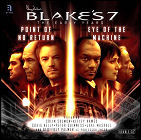 Eye Of The Machine: Brilliant post-grad computer science whiz Kerr Avon meets two people who will change his life forever: renowned artificial intelligence instructor David Ensor, and would-be revolutionary Anna Grant, who is rallying college students to the cause of an unconventional, up-and-coming politician named Roj Blake. Each of these people have their own agendas where Avon is concerned, and both of them will change his feelings on the subject of trust forever.
Eye Of The Machine: Brilliant post-grad computer science whiz Kerr Avon meets two people who will change his life forever: renowned artificial intelligence instructor David Ensor, and would-be revolutionary Anna Grant, who is rallying college students to the cause of an unconventional, up-and-coming politician named Roj Blake. Each of these people have their own agendas where Avon is concerned, and both of them will change his feelings on the subject of trust forever.
Point Of No Return: Major Stefan Travis, a rising but unremarkable Federation officer, is specifically requested to head up an investigation into the activities of revolutionary – and suspected terrorist – Carl Varon, and his help has been requested by Varon himself, who insists he is being framed by the Federation. When Travis looks into the evidence records that landed Varon in prison, he does indeed find a few clues that Varon may have been railroaded, enough to put a seed of doubt about the Federation’s motives in Travis’ mind. But when a dead man and a murder weapon turn up, Travis wonders if anyone in this case is telling him the truth. When he discovers that Varon may be planning an attack that could result in a stunning loss of civilian lives, Travis takes no chances.
Point Of No Return written by James Swallow
Eye Of The Machine written by Ben Aaronovitch
Point Of No Return directed by Duncan McAlpine
Eye Of The Machine directed by Andrew Mark Sewell
music by Alistair LockPoint Of No Return Cast: Craig Kelly (Travis), Jake Maskall (Sublieutenant Garcia), Peter Guinness (Carl Varon)
Eye Of The Machine Cast: Colin Salmon (Avon), Keeley Hawes (Anna Grant), Geoffrey Palmer (Professor Ensor)
Notes: The plot point of the Tariel Cells – a common element in all Federation/human technology – is carried over from the original Blake’s 7 TV series; in the TV series, Orac was able to obtain information from almost any Federation computer system via a “back door” left for him in the Tariel Cells by their inventor (and Orac’s creator), Ensor. Orac has not yet been introduced to the reimagined Blake’s 7 as of this CD’s release.
LogBook entry and TheatEar review by Earl Green
Review: The strongest of any of B7 Media’s reimagined Blake’s 7 releases so far, this second Early Years CD not only does the strongest storytelling of the series to date, with outstanding actors and dialogue, but it’s the first release to make me wish that they could do these “origin stories” for the characters as they appeared in the original TV series.
Colin Salmon continues to be an intriguing new interpretation of Avon, and Eye Of The Machine gives a backstory to his somewhat softer (but still ruthless) version of the character. Avon still suffers a betrayal here, but it’s a different one than established in the original series – though it doesn’t rule out that the original series’ backstory (Avon betrayed by Anna Grant, who is in reality a Federation deep-cover agent) may yet unfold in this version of the story. The character of Ensor makes his first appearance in the new audio adventures here, raising the intriguing question of whether or not the audios are about to revisit/revise the story of supercomputer Orac (Ensor’s invention in the TV series). As with When Vila Met Gan, Blake’s grab for legitimate political power sets the backdrop of the story, though we get a little bit of a taste of the post-election clampdown by the powers that be… who clearly wish to remain in power.
Point Of No Return neatly illustrates the ongoing debate between civil liberties and state security as a compact piece of drama that isn’t wasteful with dialogue or plot developments. The central mystery of whether or not Travis’ prisoner has been framed is a neat one – here’s a man who’s been imprisoned by the Federation for his political views, of course he’s innocent. Writer James Swallow neatly turns this expectation on its ear and takes the opportunity to reveal that there’s a reason the Federation clamped down on its citizens’ freedoms. Perhaps not a good reason or a commendable reason, but a justification nonetheless. The story doesn’t resolve its multiple shades of grey for the benefit of the listener’s comfort – an excellent script, brought to life brilliantly. Kudos are also due to Craig Kelly, who delivers his own interpretation of Travis while also reminding one, ever so slightly, of original TV Travis actor Stephen Grief – a very nice balance indeed.
More like this, please. It might just able sell me on this whole revamped Blake’s 7 business.
